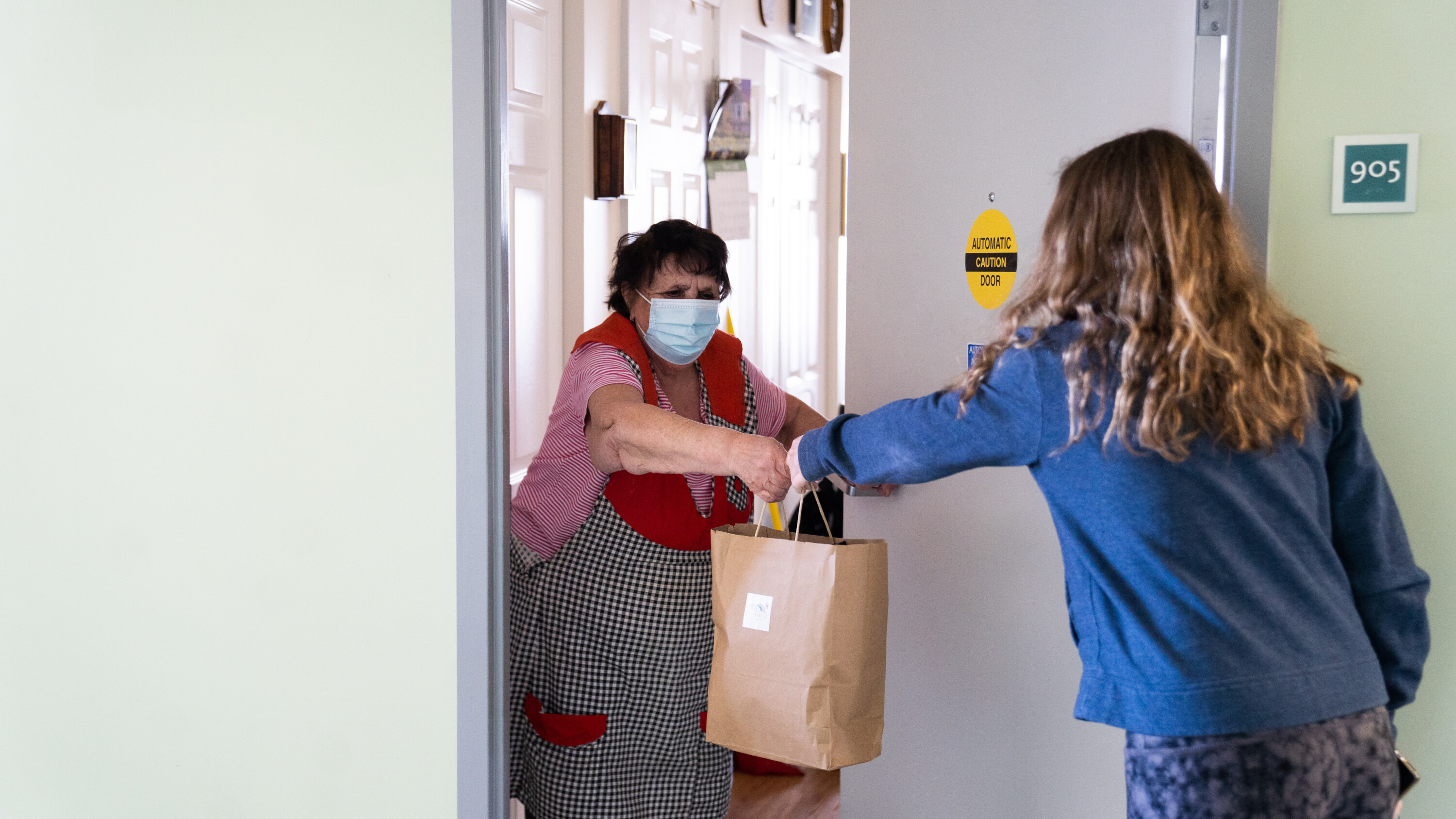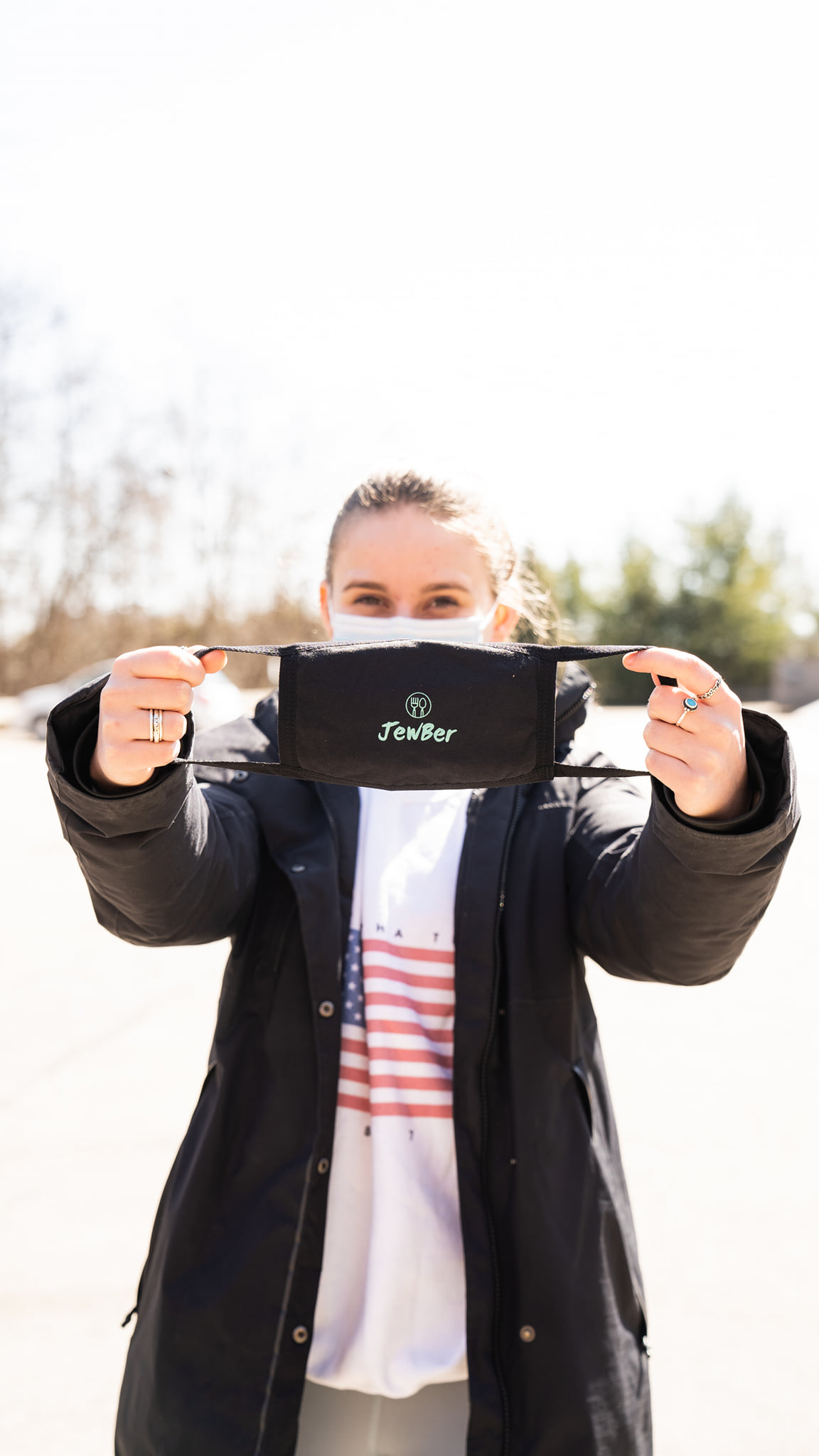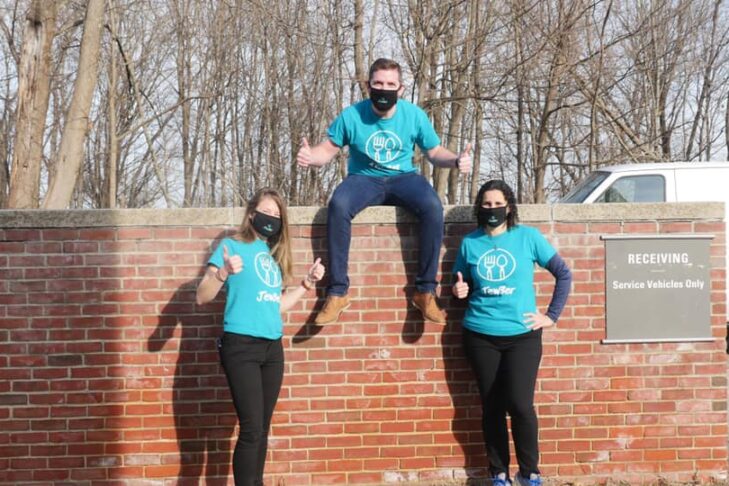Almost exactly a year ago, Boston Medical Center ICU nurse Benzi Miller was talking with Simon Luxemburg about Passover and how they would face the new chaos of an emerging pandemic with the nearing holiday.
“Simon asked me, ‘What are you doing for Pesach? Do you need food?’” Miller said.
Normally Miller spends the week-long holiday with his family. His parents would keep their kitchen kosher for Passover, and beyond the enjoyment of being with family, it was easier to not have to kasher his own home.
In April 2020, though, Miller was working non-stop, like many front-line heroes at the time, against the coronavirus that was bringing people across the U.S. into quarantines and lockdowns. Miller was off during the days but with the late nights and extra hours of shifts, the only time he was available for grocery shopping was the early morning senior-only times when he got off work.
“It became very difficult for me to get food,” Miller said.
This is how JewBer was born.
“After three weeks of being told the best thing we could do in the pandemic was stay home, suddenly we saw an opportunity to support those working on the front lines. We quickly found volunteers eager to help and medical professionals grateful for kosher meals delivered to their front doors,” says Myla Green, who co-founded JewBer along with fellow MBA Hornstein and Brandeis University classmates Ana Sazonov and Simon Luxemburg.
After the success of Passover, JewBer began serving Miller and other front-line heroes with weekly Passover meals, as these doctors and nurses were aiding the greater community through an unprecedented time.
“I had a huge box of food at my house. It was so nice not to have to cook for myself. Everything I needed was right there,” Miller said. “You guys helped me out. It was one of the things that kept me going during COVID.”
And as the pandemic continued, JewBer grew in size and outreach.
“Two months into JewBer’s operation, we started thinking about who else might need our support in the pandemic,” Green said. After surveying our volunteers, we added low-income seniors and Holocaust survivors to our weekly meal recipients.”

From 153 meals during Passover 2020 to an additional 2,500 meals within a year, JewBer has served front-line heroes, low-income families, homebound elderly and Holocaust survivors in the Boston area.
“My thanks for the delicious gourmet meal, from soup to dessert. You spoil me,” Holocaust survivor Judith Podolsky shared with JewBer, adding that the volunteers “take time out to deliver to the elderly. It takes special people to do that.”
Students from Solomon Schechter Day School and JCDS, Boston’s Jewish Community Day School, also participated in Shabbat meal deliveries by making cards and packaging mishloach manot filled with grape juice and other goodies like hamantashen and Bissli.
Volunteers have come to JewBer throughout the greater community over the past year. As part of the Dorot Program, JewBer connected Boston-based college students with over 100 Holocaust survivors to deliver monthly Shabbat meals.

This program and mission to serve the Holocaust survivor population in Boston attracted Rabbi Danielle Eskow to become involved with the organization. “I was so impressed and excited with this concept. I do a lot of work with the survivor community and wanted to find a way to give back on a regular basis and include my children so that they can learn the value of giving back as well as spend time with survivors,” Eskow said. “This is one small way that we can honor my husband’s grandparents’ memory and continue their legacy through to our children.”
This connection is part of the reason Susan Creditor and her husband, Bruce, have enjoyed volunteering with JewBer weekly since December.
“It’s not really so much about us. It’s about how isolated they are,” Creditor said. “It’s been a wonderful experience. It’s done our hearts good.”
Creditor mentioned a woman they deliver to weekly who has dementia. Due to the pandemic, she has not been able to see her children—or anyone else beyond her house. She has become sad, but the exchange the Creditors and she share each week has touched both parties.
“It’s been a really great thing for us,” Creditor said. “We love doing it every week.”
Another family unit, Paige Peritt and her daughter Ilana, have been volunteering for years together as a family. Making weekly deliveries for JewBer, though, has allowed them to spend time and, as Peritt said, “make someone’s Shabbat a bit easier.”
“What I love about JewBer is that it provides an opportunity for the Jewish community to care for each other in a direct way,” she said.

Ilana, a senior at Brandeis University, added the importance of doing this work during a pandemic. “I felt an itch to do something meaningful with my time this year, and I felt very stagnant with my day-to-day routine,” Ilana said. “The best part is being able to hand the food directly to the receiver, but of course that’s not always possible as our health care heroes are usually at work, but being able to exchange a wave or even a friendly text allows me to enter into Shabbat and the new week with a full heart.”
JewBer also has brought the Jewish concept of tikkun olam to life for many of the volunteers.
“JewBer represents our Jewish ideals completely,” Eskow said. “It is our responsibility to give back to those in need, to support those in need, and to do our part to honor those who came before us.”
For Peritt, it goes back to a teaching in didactic Jewish ethical literature.
“There’s a Pirkei Avot teaching that I appreciate that you don’t have to complete the work, but you cannot desist from it either,” Peritt said. “Everyone needs to do their small part and work together.”
Ilana also agreed with this sentiment.
“The JewBer effort intersects really strongly with my appreciation and love for the incredible culture and community that Judaism embodies,” Ilana said. “It allows me to stay connected in these disconnected and isolated times that we’re living through.”
Looking back on the last year, Green sees JewBer as the most meaningful thing she has done. “As someone who kept my job while entering full-time graduate school, the last thing I had planned to do was to take on another obligation. And yet JewBer has kept me connected not only to the Jewish community that we are serving but has also been a substantive way to apply my business school and Jewish professional leadership coursework in real time.”
To learn more about JewBer, its impact and more, visit jewberboston.org.
This post has been contributed by a third party. The opinions, facts and any media content are presented solely by the author, and JewishBoston assumes no responsibility for them. Want to add your voice to the conversation? Publish your own post here. MORE



